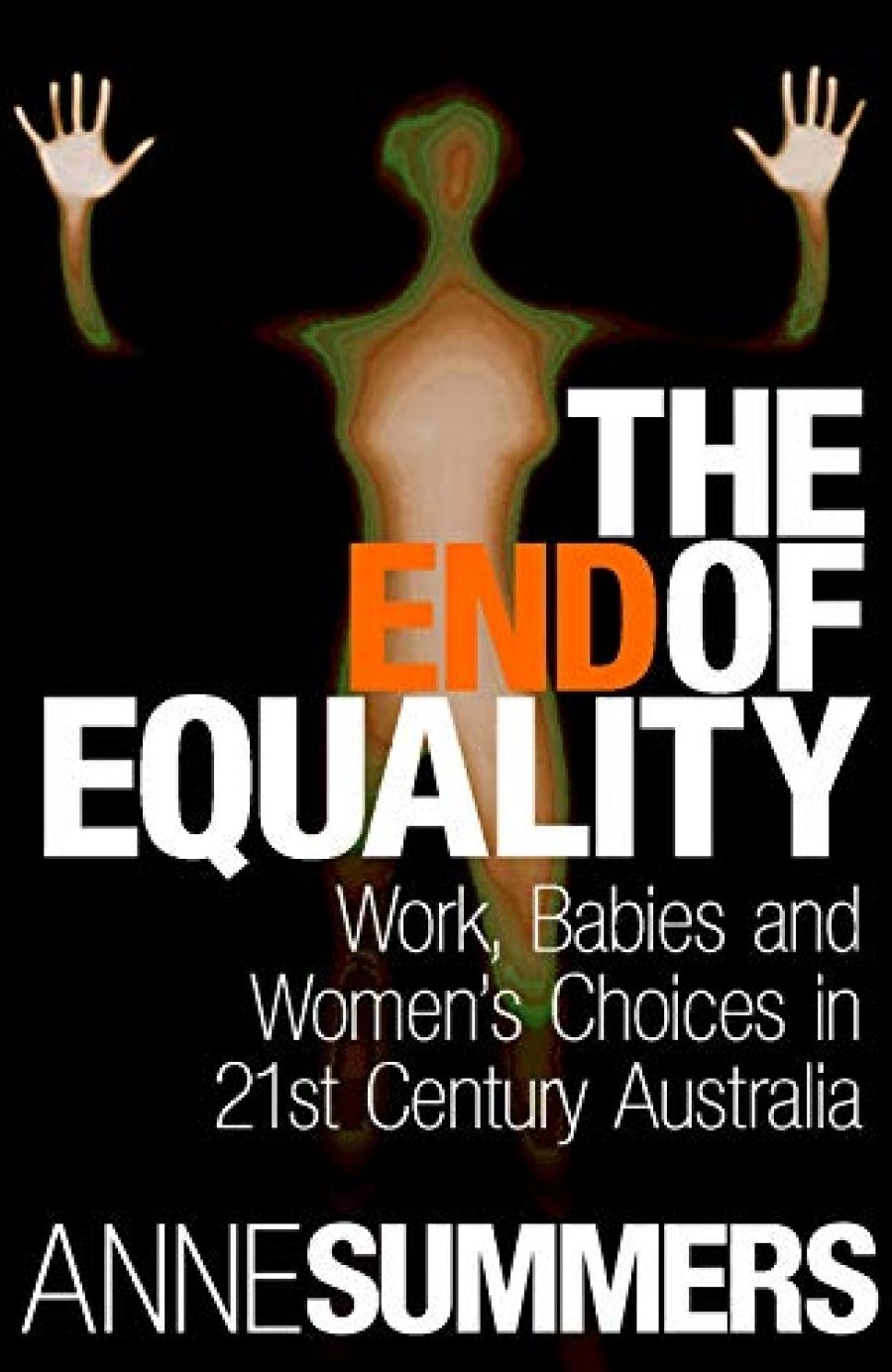
- Free Article: No
- Contents Category: Feminism
- Review Article: Yes
- Online Only: No
- Custom Highlight Text:
‘Women who want to be equal with men lack ambition.’ This was the rather damning assessment of equality-based or liberal feminism scrawled on public walls in the 1970s and 1980s. It took a swipe at the strategy of achieving civil and economic equality on men’s terms. It sought a radical agenda of change that would bring about profound alteration to the deepest social, economic and psychic structures of gender identity, patriarchy and capitalism. It demonstrated, even then, that ‘equality’ did not have unqualified support among women. Thirty years later, Anne Summers is in a position to consider how this strategy has stood up to repeated attacks, and its overall gains and shortcomings.
As the author of the highly influential cultural history of Australian sexual stereotypes, Damned Whores and God’s Police: The Colonization of Women in Australia (1975), past editor of Good Weekend and the American Ms. magazine, former adviser to Prime Minister Paul Keating, head of the Office of the Status of Women, and presently chair of the board of Greenpeace International, Summers can hardly be accused of being a woman who lacks ambition. But it has been her ambitions for Australian women that has made her an inspiring and formidable advocate for the nuts and bolts of women’s self-realisation: equal pay, employment and educational opportunities; access to affordable, good quality childcare; reproductive rights; and freedom from violence and discrimination. It is poignant that this iconic Australian feminist should, in this her most recent work, assess those ambitions as initially half-realised but now increasingly mired in the parochial family policies of the Howard government.
Summers’s book is in one sense a reappraisal of her life’s work, and that of thousands of Australian feminists like her. What she sees is their hard-won gains being corroded by the deliberate yet undeclared government ruse of a Baby Bar. She carefully argues the case that Howard sees care as a private responsibility, not a public or community obligation, and a responsibility that should remain the duty of women. Through soaring childcare costs, punitive and opaque family benefits and taxation, and the dismantling or crippling of the peak watchdog bodies that protected women from sex discrimination, Howard has pushed women out of the workforce and enforced a return to separate spheres. Increasing numbers of educated, skilled and experienced women are flummoxed to find themselves behind Howard’s ‘white picket prison’, living Betty Friedan’s feminine mystique.
The author’s case is detailed and convincing. The strategy of equality has not been a failure: it has been systematically undermined by successive governments with no real commitment to women’s rights. Nevertheless, there is scope to examine the premise of equality and to consider whether motherhood is experienced by Australian women as the ‘crunch’ because it is the principle expression of sexual difference, a difference that has not been accommodated in the labour market.
It is no coincidence that Summers’s review of the gains of second-wave, equality-based feminism both reiterates its importance as the most viable strategy for women’s economic independence and unwittingly articulates the limits of this strategy. In 1975 Summers was more qualified about equality. She wrote: ‘To demand equality is to concede that the standards and practices devised by and for men are the most desirable and that these should provide the guide for female emancipation.’ Summers then saw ‘equality reforms’ as doing little to alter the relations between the sexes. Significantly, however, they were ‘not to be disparaged’, since legislative and legal changes towards that objective would certainly make women’s lives better, short of providing for their absolute liberation. Women therefore ‘ought to be squeezed into the existing system’, to gain a foothold from which to advocate more radical change to that system.
Summers concludes her latest book with an ‘Acting Up’ section in which she hopes to ‘restart the revolution’. Yet it seems curious that, having carefully documented the penalties working mothers face, she insists that women want to be considered as individuals, not mothers, in policy formulation. It is women as singular atomised individuals, without connection to community and certainly without caring responsibilities, who have benefited most from the liberal individualism that informed the push for equality. Women whose difference was indelibly marked by motherhood are unable to mirror the male worker as the unfettered individual, who either has no caring responsibilities or has a wife to manage them. Arguably, it is the sexual difference of motherhood that makes the most radical demands on feminist strategy. To be workers, mothers need to be accommodated as carers, requiring a wholesale restructuring of industrial relations, family structure, business practice and community infrastructure.
Summers’s book illustrates an historical moment for mothers: the specification of their difference and the dawning realisation that we have not benefited from the palpable gains of equality-based feminism. What mothers need is something far more radical. On the list I convene called ‘The Mothers of Intervention’, mothers don’t want to be thought of as individuals, with the associated loss of interrelatedness to community and family. They have experienced the benefits and the failures of equality. There is, dare I say, a third way, between women becoming more like men, and the demands for radical change required by motherhood. It would genuinely constitute the revolution that Summers hopes to restart. It requires men to show the ambition to be more like women, specifically mothers.


Comments powered by CComment